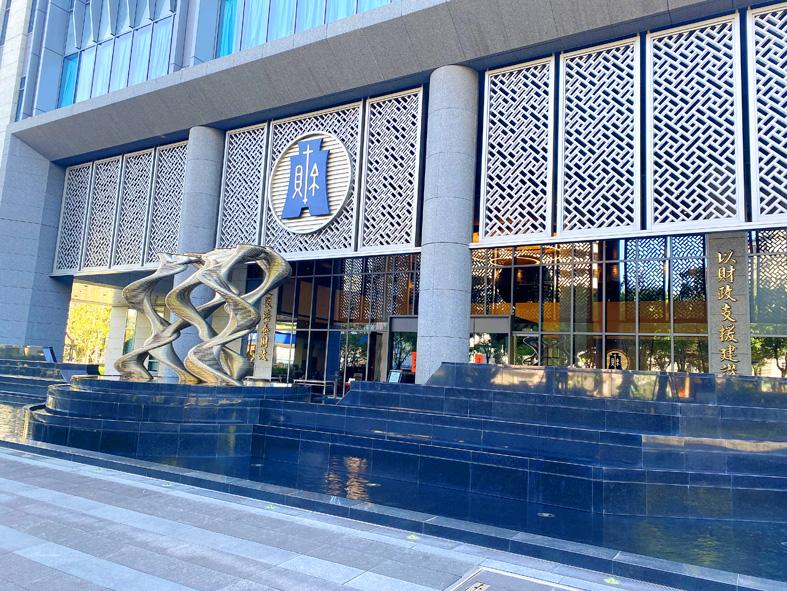The government last month collected NT$76.8 billion (US$2.71 billion) in tax revenue, down 2.7 percent from February last year, the Ministry of Finance said yesterday, attributing the retreat to lower revenue from securities transaction and sales taxes.
Securities transaction tax revenue was NT$11 billion, down 13.9 percent year-on-year, as daily turnover shrank 9 percent to NT$362.9 billion, Department of Statistics Deputy Director-General Chen Yu-feng (陳玉豐) said.
Russia’s invasion of Ukraine and expectations of the US Federal Reserve increasing interest rates drove investors to the sidelines, Chen said.

Photo: Clare Cheng, Taipei Times
Foreign portfolio managers have cut holdings in local shares, as they are concerned about fuel and grain price increases exacerbating supply chain disruptions and weighing on corporate profits.
However, most Taiwanese tech and non-tech firms posted hefty year-on-year revenue increases for January and last month, and are expecting month-on-month revenue increases for this month, after last month had fewer working days due to the Lunar New Year holiday.
The Financial Supervisory Commission has said that the local bourse is expected to lose trading momentum this year, as global central banks would phase out favorable programs intended to mitigate effects of the COVID-19 pandemic.
Most Western countries have chosen to tolerate the virus, it said.
Sales tax revenue was NT$10.7 billion, down 29.4 percent year-on-year, as the government cut the sales tax on oil and diesel imports to ease inflationary pressures, and component shortages weighed on automakers, the ministry said.
Personal income tax revenue jumped 33.3 percent to NT$9.3 billion and corporate income tax revenue rose 89.9 percent to NT$5.3 billion, it said, attributing the trend to year-end bonuses.
Revenue from land value increment tax gained 0.9 percent to NT$7.2 billion, as taxable cases picked up 1.9 percent, it said.
For the first two months, overall tax revenue expanded 5.1 percent to NT$280 billion, ahead of the budget schedule by 11.3 percent, the ministry said.

GROWING OWINGS: While Luxembourg and China swapped the top three spots, the US continued to be the largest exposure for Taiwan for the 41st consecutive quarter The US remained the largest debtor nation to Taiwan’s banking sector for the 41st consecutive quarter at the end of September, after local banks’ exposure to the US market rose more than 2 percent from three months earlier, the central bank said. Exposure to the US increased to US$198.896 billion, up US$4.026 billion, or 2.07 percent, from US$194.87 billion in the previous quarter, data released by the central bank showed on Friday. Of the increase, about US$1.4 billion came from banks’ investments in securitized products and interbank loans in the US, while another US$2.6 billion stemmed from trust assets, including mutual funds,

AI TALENT: No financial details were released about the deal, in which top Groq executives, including its CEO, would join Nvidia to help advance the technology Nvidia Corp has agreed to a licensing deal with artificial intelligence (AI) start-up Groq, furthering its investments in companies connected to the AI boom and gaining the right to add a new type of technology to its products. The world’s largest publicly traded company has paid for the right to use Groq’s technology and is to integrate its chip design into future products. Some of the start-up’s executives are leaving to join Nvidia to help with that effort, the companies said. Groq would continue as an independent company with a new chief executive, it said on Wednesday in a post on its Web

JOINT EFFORTS: MediaTek would partner with Denso to develop custom chips to support the car-part specialist company’s driver-assist systems in an expanding market MediaTek Inc (聯發科), the world’s largest mobile phone chip designer, yesterday said it is working closely with Japan’s Denso Corp to build a custom automotive system-on-chip (SoC) solution tailored for advanced driver-assistance systems and cockpit systems, adding another customer to its new application-specific IC (ASIC) business. This effort merges Denso’s automotive-grade safety expertise and deep vehicle integration with MediaTek’s technologies cultivated through the development of Media- Tek’s Dimensity AX, leveraging efficient, high-performance SoCs and artificial intelligence (AI) capabilities to offer a scalable, production-ready platform for next-generation driver assistance, the company said in a statement yesterday. “Through this collaboration, we are bringing two

Even as the US is embarked on a bitter rivalry with China over the deployment of artificial intelligence (AI), Chinese technology is quietly making inroads into the US market. Despite considerable geopolitical tensions, Chinese open-source AI models are winning over a growing number of programmers and companies in the US. These are different from the closed generative AI models that have become household names — ChatGPT-maker OpenAI or Google’s Gemini — whose inner workings are fiercely protected. In contrast, “open” models offered by many Chinese rivals, from Alibaba (阿里巴巴) to DeepSeek (深度求索), allow programmers to customize parts of the software to suit their